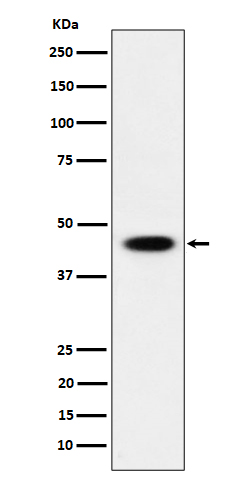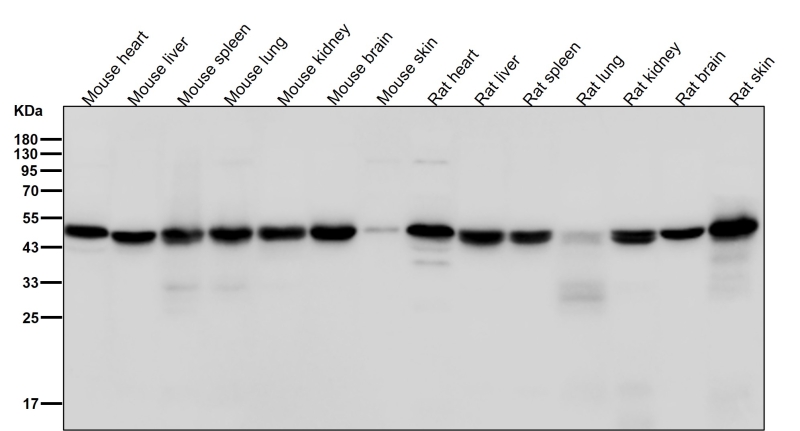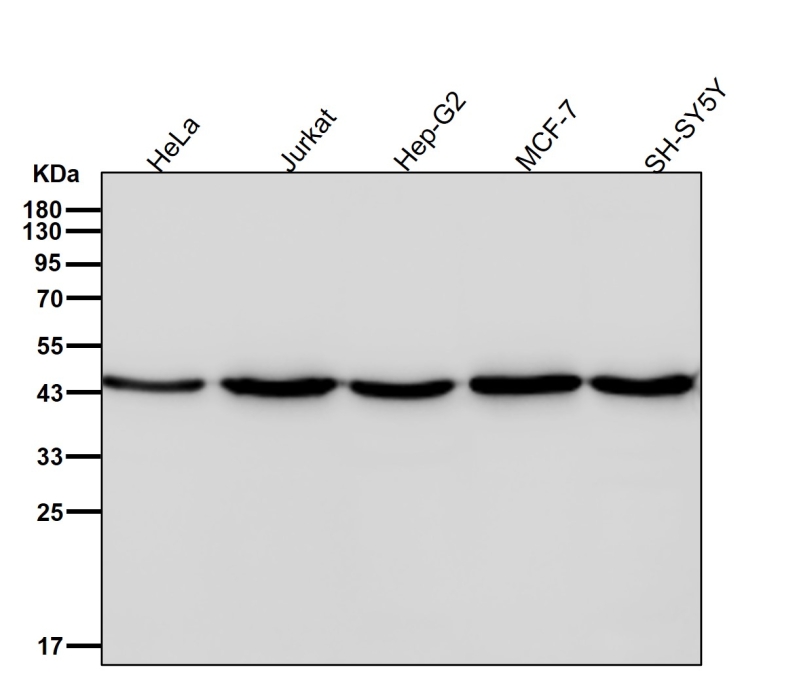


| WB | 咨询技术 | Human,Mouse,Rat |
| IF | 咨询技术 | Human,Mouse,Rat |
| IHC | 咨询技术 | Human,Mouse,Rat |
| ICC | 1/50-1/200 | Human,Mouse,Rat |
| FCM | 1/20-1/100 | Human,Mouse,Rat |
| Elisa | 咨询技术 | Human,Mouse,Rat |
| Aliases | ADEH; ADSS; AMPSase 2;;AdSS 2 |
| WB Predicted band size | Calculated MW: 50 kDa ; Observed MW: 45 kDa |
| Host/Isotype | Rabbit IgG |
| Antibody Type | Primary antibody |
| Storage | Store at 4°C short term. Aliquot and store at -20°C long term. Avoid freeze/thaw cycles. |
| Species Reactivity | Human,Mouse,Rat |
| Immunogen | A synthesized peptide derived from human AdSS 2 |
| Formulation | Purified antibody in PBS with 0.05% sodium azide,0.05% BSA and 50% glycerol. |
+ +
以下是关于AdSS2(腺苷琥珀酸合成酶2)抗体的3篇模拟参考文献示例(仅供参考,具体文献需通过学术数据库核实):
---
1. **文献名称**:*Adenylosuccinate Synthetase 2 (ADSS2) Autoantibodies in Inflammatory Myopathies*
**作者**:Marie, J. et al.
**摘要**:本研究首次报道了ADSS2自身抗体在特发性炎症性肌病(如多发性肌炎)患者血清中的存在。通过免疫沉淀和质谱分析,发现ADSS2抗体与肌肉线粒体功能障碍相关,可能作为疾病生物标志物。
---
2. **文献名称**:*ADSS2 Deficiency Disrupts Mitochondrial Function: Insights from Antibody-Based Protein Localization*
**作者**:Chen, L. & Wang, H.
**摘要**:利用特异性ADSS2抗体进行免疫荧光和Western blot分析,揭示了ADSS2蛋白在线粒体中的定位及其缺失对嘌呤代谢和细胞能量稳态的影响,为遗传性肌病的机制研究提供依据。
---
3. **文献名称**:*Development of a Monoclonal Antibody Targeting ADSS2 for Cancer Metabolism Research*
**作者**:Tanaka, K. et al.
**摘要**:研究团队开发了一种高特异性抗ADSS2单克隆抗体,并验证其在结直肠癌组织中的表达水平。结果显示ADSS2在肿瘤代谢重编程中可能发挥关键作用,抗体可用于靶向治疗研究。
---
**备注**:以上文献为示例性内容,实际文献需通过PubMed、Google Scholar等平台以“ADSS2 antibody”或“Adenylosuccinate Synthetase 2”为关键词检索。建议结合具体研究领域筛选相关论文。
The AdSS2 antibody targets adenylosuccinate synthase 2 (AdSS2), a key enzyme in the purine nucleotide cycle responsible for catalyzing the conversion of inosine monophosphate (IMP) and aspartate to adenylosuccinate. This mitochondrial enzyme plays a critical role in cellular energy metabolism, particularly in tissues with high energy demands, such as cardiac and skeletal muscle. Dysregulation of AdSS2 has been implicated in metabolic disorders, mitochondrial dysfunction, and certain cancers.
Research using AdSS2 antibodies has focused on elucidating its expression patterns and mechanistic contributions to disease. Studies suggest AdSS2 overexpression in hepatocellular carcinoma and colorectal cancer, where it may promote tumor progression by sustaining nucleotide synthesis and energy homeostasis. The antibody is widely employed in techniques like Western blotting, immunohistochemistry (IHC), and immunofluorescence (IF) to assess protein levels, subcellular localization, and interactions in both physiological and pathological contexts.
Recent investigations also explore AdSS2's potential as a therapeutic target, particularly in cancers reliant on purine metabolism. Inhibiting AdSS2 activity could disrupt nucleotide pools, impairing tumor growth. Additionally, its role in myocardial ischemia-reperfusion injury highlights relevance in cardiovascular research. The AdSS2 antibody thus serves as a vital tool for probing metabolic adaptations in disease, offering insights into diagnostic or therapeutic strategies targeting energy metabolism pathways.
×